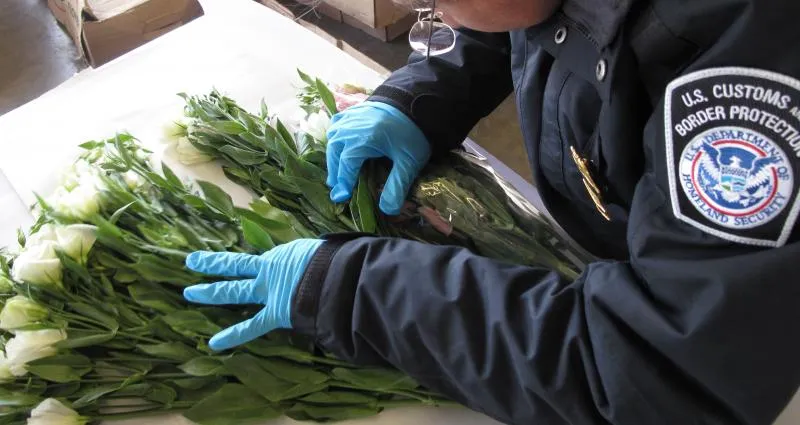LAREDO, Texas – With the arrival of Mother’s Day this weekend, U.S. Customs and Border Protection (CBP) agriculture specialists at South Texas ports of entry continue to conduct examinations and maintain strict vigilance to ensure that personal and commercial importations of flowers are free from insects, pests and diseases that could harm the agricultural and floral industries of the United States.
“Although vehicular traffic is temporarily reduced due to current travel restrictions, CBP officers and agriculture specialists nevertheless typically encounter floral arrangements from Mexico during the Mother’s Day holiday period and maintain their commitment to uphold federal agricultural regulations," said Director, Field Operations Randy J. Howe, Laredo Field Office. "To avoid unnecessary delays or fines, we encourage travelers to consult the 'Know Before You Go' guide and declare all agricultural items purchased in Mexico."

at Laredo Port of Entry.
While a relatively small number of harmful pests are discovered among the millions of stems inspected by CBP, a single dangerous pest could cause millions of dollars of damage to our nation’s crops.
In advance of this traditionally busy period for floral imports, CBP is reminding border crossers who plan to import flowers and plants from Mexico to advise their florist that the arrangements are destined for U.S. delivery. Some flowers and plant materials commonly found in floral arrangements are prohibited, including chrysanthemums and choysia (a green citrus-like floral filler) due to pest risk. Gladiolas are enterable in the passenger environment without restriction unless signs of disease are present.
CBP recommends that people who wish to import flowers, plant materials, and other agricultural items consult the U.S. Animal and Plant Health Inspection Service requirements before they travel; this addresses cut flower importations.
Cross-border travelers should also declare all items they have acquired abroad to CBP officers upon entry to avoid possible civil or criminal penalties.
CBP also reminds the traveling public that although individual states have begun to reopen, temporary restrictions on non-essential cross border travel remain in effect though at least May 20. For more information, please consult this link to the Federal Register notice.
Traditionally, Mother’s Day, Valentine’s Day and the Easter holiday weekend are times when CBP agriculture specialists are very busy inspecting floral arrangements. At international ports of entry, land borders, and international mail facilities, CBP agriculture specialists are the front line in the fight against the introduction of insect pests and diseases into the United States.
Please bear in mind that chrysanthemums are prohibited from personal use importation due to pest risk.

